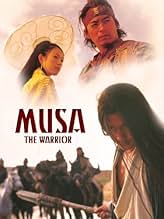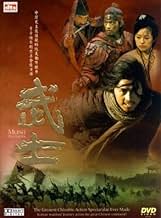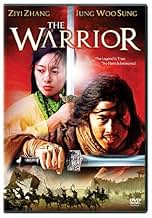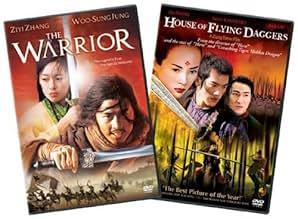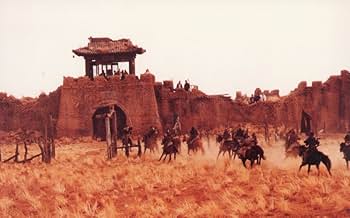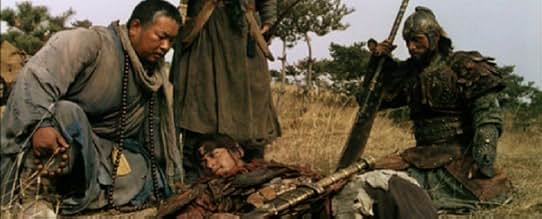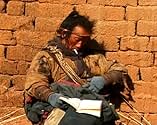IMDb रेटिंग
7.1/10
11 हज़ार
आपकी रेटिंग
इंपीरियल चीन द्वारा निर्वासित नौ कोर्यो योद्धा मंगोलियाई सैनिकों से एक चीनी मिंग राजकुमारी की रक्षा के लिए लड़ाई करते हैं.इंपीरियल चीन द्वारा निर्वासित नौ कोर्यो योद्धा मंगोलियाई सैनिकों से एक चीनी मिंग राजकुमारी की रक्षा के लिए लड़ाई करते हैं.इंपीरियल चीन द्वारा निर्वासित नौ कोर्यो योद्धा मंगोलियाई सैनिकों से एक चीनी मिंग राजकुमारी की रक्षा के लिए लड़ाई करते हैं.
- पुरस्कार
- 6 जीत और कुल 11 नामांकन
Ziyi Zhang
- Princess Bu-yong
- (as Zhang Ziyi)
Park Jeong-hak
- Ga-nam
- (as Park Jung-hak)
Jeong Mi-nam
- Yongho Soldier
- (as Mi-Nam Jung)
फ़ीचर्ड समीक्षाएं
10skduncan
Based on actual events, Korean diplomats were sent into China with military escorts in 1375. Remember Europe was emerging from the Dark Ages at this time, but in Asia they were an advanced civilization. With the rise of the famous Ming Dynasty in China and the waning days of the Mongols, the Korean emperor was eager to formalize ties with the new Chinese government. This is the story of one of the those diplomatic missions.
This is an epic film, shoot over 9000 miles of China's northern region. Covering plains, prairies, forests, deserts and coastline. The cinematography is beautiful.
Though this is a Korean film, it utilizes the famous Chinese actress Zhang Ziyi, who portrays a kidnapped daughter of the Chinese Emperor.
Throughout most of the film the Korean warriors speak Korean. The Princess and the Chinese villagers speak Mandarin. Interestingly the Mongols also speak Mandarin to each other, historically inaccurate but Mongols don't go to movies these days. Some of the Koreans can also speak Mandarin. This is accurate since the educated Koreans of the time, could read, write and speak Chinese. This film is subtitled in English.
This is a grand story of honor, sacrifice and overcoming overwhelming odds. The Korean warriors must fight the larger forces of the Mongols. Using tactics and strategies not unlike that which you can find in Sun Tzu's the Art of War writings.
If you want some insight into the culture and attitudes of the people of this region, Musa is the movie for you.
This is an epic film, shoot over 9000 miles of China's northern region. Covering plains, prairies, forests, deserts and coastline. The cinematography is beautiful.
Though this is a Korean film, it utilizes the famous Chinese actress Zhang Ziyi, who portrays a kidnapped daughter of the Chinese Emperor.
Throughout most of the film the Korean warriors speak Korean. The Princess and the Chinese villagers speak Mandarin. Interestingly the Mongols also speak Mandarin to each other, historically inaccurate but Mongols don't go to movies these days. Some of the Koreans can also speak Mandarin. This is accurate since the educated Koreans of the time, could read, write and speak Chinese. This film is subtitled in English.
This is a grand story of honor, sacrifice and overcoming overwhelming odds. The Korean warriors must fight the larger forces of the Mongols. Using tactics and strategies not unlike that which you can find in Sun Tzu's the Art of War writings.
If you want some insight into the culture and attitudes of the people of this region, Musa is the movie for you.
There is a nothing like a good epic film. Here is a fine entry to the genre from South Korea, a nation that doesn't normally make these sort of films. Film in China and staring the beautiful Zhang Ziyi it had potential.
Set in 1374 relations between Korea and the Ming Dynasty in China are at a low. The Koreans send a diplomatic mission to resort their relationship, led by General Choi-Jung (Joo Jin-mo). However when arriving in a city he team are captured and exiled from China. Left for dead in the desert their run into a Mongol army party which have captured Princess Bu-yong (Zhang Ziyi). The Korean party save her and hope to return her to Emperor, saving their mission. Within the party is Yeosol (Jung Woo-sung), a recently freed slave who was loyal to his master and excellent fighter with a spear. He and the Princess have an attraction to each other. After freeing the Princess, the Mongols are upset. There were hoping to use her as a bargaining chip against the Ming's China. They chase the Koreans and destroy countryside villages to get her back.
The story and plot are simply and believable within the context of the film; always good signs. Within the group many of characters and relationships are developed, especially Yeosol, the General, the Princess and Jinlip, the veteran of the group. Even the main bad guy has some nobility about him. The costumes and weaponry are excellently done. The warfare was brutal and shows woman and children getting killed, something that rarely happens in Hollywood films. The film is deliciously violence. My only real problem with the film, which lets it down is the action. It is good that the action is violence, but it is so overly edited and the shaky-cam make it difficult to follow. If the action was better then the would have been even better.
If you enjoy films like the Lord of the Rings trilogy, Gladiator, Conan the Barbarian and Red Cliff, you will like this film.
Set in 1374 relations between Korea and the Ming Dynasty in China are at a low. The Koreans send a diplomatic mission to resort their relationship, led by General Choi-Jung (Joo Jin-mo). However when arriving in a city he team are captured and exiled from China. Left for dead in the desert their run into a Mongol army party which have captured Princess Bu-yong (Zhang Ziyi). The Korean party save her and hope to return her to Emperor, saving their mission. Within the party is Yeosol (Jung Woo-sung), a recently freed slave who was loyal to his master and excellent fighter with a spear. He and the Princess have an attraction to each other. After freeing the Princess, the Mongols are upset. There were hoping to use her as a bargaining chip against the Ming's China. They chase the Koreans and destroy countryside villages to get her back.
The story and plot are simply and believable within the context of the film; always good signs. Within the group many of characters and relationships are developed, especially Yeosol, the General, the Princess and Jinlip, the veteran of the group. Even the main bad guy has some nobility about him. The costumes and weaponry are excellently done. The warfare was brutal and shows woman and children getting killed, something that rarely happens in Hollywood films. The film is deliciously violence. My only real problem with the film, which lets it down is the action. It is good that the action is violence, but it is so overly edited and the shaky-cam make it difficult to follow. If the action was better then the would have been even better.
If you enjoy films like the Lord of the Rings trilogy, Gladiator, Conan the Barbarian and Red Cliff, you will like this film.
I'd never heard of this movie until my buddy Eric rented it; that Blockbuster carries it is I guess a good sign. Part Crouching Tiger, part Saving Private Ryan, with just a smidgen of Hidden Fortress and an echo of Xenophon, Musa is a highly enjoyable movie.
The movie begins in 1375 with a failed delegation from Korea to the Ming dynasty. Led by General Choi Jung (Jin-mo Ju), the delegation become prisoners of the Ming, being led off to exile, when the Mongols strike. Suddenly finding themselves free, the delegation decides to rescue the captive Ming princess (Ziyi Zhang, of Crouching Tiger fame) who travels with the Mongols. When they succeed, naturally, the Mongols want her back, and thus begins an arduous trek across the desert, culminating in a Road Warrior-esque fight at a battered old castle where the survivors hole up against their much more mobile but less-civilized attackers.
Musa has action in spades, some of it exceptionally grisly (every archery attack is cause for dozens of shots of gruesome impalings). The battles are tense and tautly filmed and feel more dangerous than most combats of this type. We eschew the beautiful martial arts style so prevalent in many Hong Kong films for a grittier and far more realistic, if a bit bloody, style here. But what Musa also possesses is atmosphere; the locations and the cinematography are top-notch, from the boundless deserts to the broken-down castle by the sea. Musa does an excellent job of selling the world it is set in.
The costumes help with this as well. Not since Brotherhood of the Wolf have I seen such elaborate and effective costuming (the armor and such here was even more intricate and character-intensive than Last Samurai, which is saying something). Each character has his own particular look, is easily told apart from the others, and costuming is ultimately an extension of character, which to me has always been the whole point. These are some of the best period costumes you'll see anywhere.
The acting is all pretty good, though it tends to come from the George Lucas school of `faster, more intense.' One facet I did like is that no one is perfect; the general is a bit of a jerk; his loyal retainer Ga-nam (Jeong-Hak Park), while a mighty warrior, lacks the ability to really think for himself; the princess is spoiled; the slave-turned-warrior Yeo-sol (Woo-sung Jung) is selfless but headstrong, and so on. Even the Mongols come across as human, if a bit savage (which, having done the research, I can attest is more or less pretty accurate).
Musa isn't for everyone due to the violence. But it's a very well done period piece with wonderful visuals that certainly captivates the viewer. It's as good or better than any of the historical epics Hollywood has released in the past few years (with the exception of The Last Samurai), and from a costuming and cinematography sense is very much worth your while to see. Just don't bother tracking this down if you're a little squeamish, that's all.
The movie begins in 1375 with a failed delegation from Korea to the Ming dynasty. Led by General Choi Jung (Jin-mo Ju), the delegation become prisoners of the Ming, being led off to exile, when the Mongols strike. Suddenly finding themselves free, the delegation decides to rescue the captive Ming princess (Ziyi Zhang, of Crouching Tiger fame) who travels with the Mongols. When they succeed, naturally, the Mongols want her back, and thus begins an arduous trek across the desert, culminating in a Road Warrior-esque fight at a battered old castle where the survivors hole up against their much more mobile but less-civilized attackers.
Musa has action in spades, some of it exceptionally grisly (every archery attack is cause for dozens of shots of gruesome impalings). The battles are tense and tautly filmed and feel more dangerous than most combats of this type. We eschew the beautiful martial arts style so prevalent in many Hong Kong films for a grittier and far more realistic, if a bit bloody, style here. But what Musa also possesses is atmosphere; the locations and the cinematography are top-notch, from the boundless deserts to the broken-down castle by the sea. Musa does an excellent job of selling the world it is set in.
The costumes help with this as well. Not since Brotherhood of the Wolf have I seen such elaborate and effective costuming (the armor and such here was even more intricate and character-intensive than Last Samurai, which is saying something). Each character has his own particular look, is easily told apart from the others, and costuming is ultimately an extension of character, which to me has always been the whole point. These are some of the best period costumes you'll see anywhere.
The acting is all pretty good, though it tends to come from the George Lucas school of `faster, more intense.' One facet I did like is that no one is perfect; the general is a bit of a jerk; his loyal retainer Ga-nam (Jeong-Hak Park), while a mighty warrior, lacks the ability to really think for himself; the princess is spoiled; the slave-turned-warrior Yeo-sol (Woo-sung Jung) is selfless but headstrong, and so on. Even the Mongols come across as human, if a bit savage (which, having done the research, I can attest is more or less pretty accurate).
Musa isn't for everyone due to the violence. But it's a very well done period piece with wonderful visuals that certainly captivates the viewer. It's as good or better than any of the historical epics Hollywood has released in the past few years (with the exception of The Last Samurai), and from a costuming and cinematography sense is very much worth your while to see. Just don't bother tracking this down if you're a little squeamish, that's all.
It's Ancient China circa 1375, the Koryo king sent a diplomatic delegation of diplomats, soldiers, and a mute slave to the Ming emperor to make peace between the Yuan and Ming dynasties, but they are regarded as spies, and thus are dispatched to a remote desert. So they begin a journey to get back home, but after learning that a Ming princess has been kidnapped by Yuan troops, the same troops that they had met and fought with earlier, they see that if they rescue her it's possible that they can get a ship needed to sail home. Cinematic ally this is a beautiful film, the action suitably epic and the film even poetic at times. I can safely say that this film is a wonder to behold even in it's edited Iternational incarnation.
My Grade: A
Region 0 DVD Extras: nothing and it's the 132 minute international cut. I love this film, but try your best to seek out the R2 Scandinavia 3-Disc SE, as it has the longer 155 minute version AND the international cut AND a great deal of extras
My Grade: A
Region 0 DVD Extras: nothing and it's the 132 minute international cut. I love this film, but try your best to seek out the R2 Scandinavia 3-Disc SE, as it has the longer 155 minute version AND the international cut AND a great deal of extras
I think it was nearly a year ago that I came across the website and first started anticipating the movie eagerly. The site contained lots of stills from the movie throughout, and every single one of them was utterly beautiful, like it had been painted to perfection rather than captured in motion. It seemed unreasonable to expect the whole movie to look that good, but I was pretty sure that it was going to be impressive. With so much anticipation and hope for a movie, it seems almost inevitable that you are going to be disappointed when you finally see it. All the more surprise then that MUSA meets and surpasses my expectations in every way!
First things first, yes... it really does look that good! All the way through . Like Zhang Yimou's SHANGHAI TRIAD, practically every frame is beautifully composed and rendered, and could easily hang on a gallery wall somewhere. There wasn't a single shot that I could imagine looking better than it did. The production design is incredible, the locations stunning, the special effects groundbreaking (the gore). I can't imagine how much time and money must have gone into its production, let alone talent and dedication.
MUSA is epic in the word's biggest sense - I couldn't help thinking of Homer's ILIAD and ODDYSEY in many parts, and those are basically the two stories that the word 'epic' was invented for. It makes Gladiator, Crouching Tiger etc look positively inconsequential. The movie is also made with an attention to detail that is remarkable. It is certainly the most convincing evocation of [relatively] ancient times that I have seen. You will really believe that you've been transported back to 400 something AD China, where Zhang Ziyi happens to be a princess and Yu Rong Guang a Mongol general. I really felt "Yes, this is what life was like back then. This is how things looked, this is how people behaved".
Despite the epic nature of the story, the central focus is always on a small-ish cast of characters, each of whom is very well conceived and developed throughout the movie's course. I'd guess there's about 15 major characters in the story, and a significant cast of minor characters. The performances are all superb - I'm pretty sure the actors themselves were quite convinced they really were their characters. The believability is enhanced by the costuming, makeup and I guess just good casting - all the different factions involved in the story totally look the part.
No epic would be complete without battle scenes, and MUSA has quite a few. These are all stunningly choreographed and filmed, not in a HK style like Bichunmoo, but in a completely real style. Beautifully shot of course, but the men fight like skilled soldiers really would (I'm sure), and get wounded/killed equally convincingly. The special effects of arrows and blades penetrating flesh are sometimes shockingly convincing. This might be disturbing to some, but it isn't played for titillation - it just adds to the gravity of the experience. It may be a little conspicuous that the heroes all manage to dispatch many times their own body weight in enemies, but you've got to give them *some* leeway for narrative convention .
There is a lot of planning involved in the battles, of a military nature, and this is also very convincing and fascinating. Almost as large a part of the process as the actual getting down to it with the weapons. A very believable insight into how battles were waged in the days when a bow & arrow was as hi-tech as weaponry got.
Hmmm... is there any aspect of the movie I haven't gushed praise over yet? A nod to the soundtrack I guess - good, very fitting. Sound effects in the battles are excellent. Ummm... and the lighting is really good too .
A cursory nod must be made to the films flaws as well though, lest I leave the reader with expectations of *total* perfection. The main flaw is that the movie wanders rather too far into melodrama & a little cliche towards the end. It would probably be kind of cheesy, except that it's all so well done you can't get too upset with it .
First things first, yes... it really does look that good! All the way through . Like Zhang Yimou's SHANGHAI TRIAD, practically every frame is beautifully composed and rendered, and could easily hang on a gallery wall somewhere. There wasn't a single shot that I could imagine looking better than it did. The production design is incredible, the locations stunning, the special effects groundbreaking (the gore). I can't imagine how much time and money must have gone into its production, let alone talent and dedication.
MUSA is epic in the word's biggest sense - I couldn't help thinking of Homer's ILIAD and ODDYSEY in many parts, and those are basically the two stories that the word 'epic' was invented for. It makes Gladiator, Crouching Tiger etc look positively inconsequential. The movie is also made with an attention to detail that is remarkable. It is certainly the most convincing evocation of [relatively] ancient times that I have seen. You will really believe that you've been transported back to 400 something AD China, where Zhang Ziyi happens to be a princess and Yu Rong Guang a Mongol general. I really felt "Yes, this is what life was like back then. This is how things looked, this is how people behaved".
Despite the epic nature of the story, the central focus is always on a small-ish cast of characters, each of whom is very well conceived and developed throughout the movie's course. I'd guess there's about 15 major characters in the story, and a significant cast of minor characters. The performances are all superb - I'm pretty sure the actors themselves were quite convinced they really were their characters. The believability is enhanced by the costuming, makeup and I guess just good casting - all the different factions involved in the story totally look the part.
No epic would be complete without battle scenes, and MUSA has quite a few. These are all stunningly choreographed and filmed, not in a HK style like Bichunmoo, but in a completely real style. Beautifully shot of course, but the men fight like skilled soldiers really would (I'm sure), and get wounded/killed equally convincingly. The special effects of arrows and blades penetrating flesh are sometimes shockingly convincing. This might be disturbing to some, but it isn't played for titillation - it just adds to the gravity of the experience. It may be a little conspicuous that the heroes all manage to dispatch many times their own body weight in enemies, but you've got to give them *some* leeway for narrative convention .
There is a lot of planning involved in the battles, of a military nature, and this is also very convincing and fascinating. Almost as large a part of the process as the actual getting down to it with the weapons. A very believable insight into how battles were waged in the days when a bow & arrow was as hi-tech as weaponry got.
Hmmm... is there any aspect of the movie I haven't gushed praise over yet? A nod to the soundtrack I guess - good, very fitting. Sound effects in the battles are excellent. Ummm... and the lighting is really good too .
A cursory nod must be made to the films flaws as well though, lest I leave the reader with expectations of *total* perfection. The main flaw is that the movie wanders rather too far into melodrama & a little cliche towards the end. It would probably be kind of cheesy, except that it's all so well done you can't get too upset with it .
क्या आपको पता है
- ट्रिवियाDuring filming in China, Woo-sung Jung got knee-injury while shooting one of his fight scenes and had to stay behind after the Korean crew came back to Korea.
- भाव
Princess Bu-yong: You could have killed me! I am a Princess!
Yeo-sol: Stop yelling at me! Don't think you can do anything you like just because you are a Princess!
Princess Bu-yong: Unhand me!
[English translation subtitles from Mandarin Chinese in Korean language film]
- इसके अलावा अन्य वर्जनInternational version runs ca. 25 minutes shorter.
टॉप पसंद
रेटिंग देने के लिए साइन-इन करें और वैयक्तिकृत सुझावों के लिए वॉचलिस्ट करें
विवरण
बॉक्स ऑफ़िस
- बजट
- BND 80,00,000(अनुमानित)
- दुनिया भर में सकल
- $9,45,922
- चलने की अवधि2 घंटे 38 मिनट
- रंग
- ध्वनि मिश्रण
- पक्ष अनुपात
- 2.35 : 1
इस पेज में योगदान दें
किसी बदलाव का सुझाव दें या अनुपलब्ध कॉन्टेंट जोड़ें






